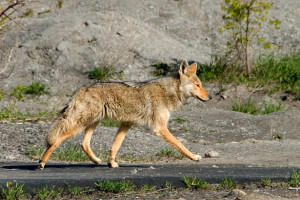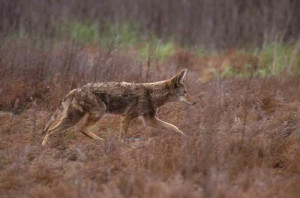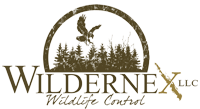 Wildernex Wildlife Control offers coyote trapping, removal, and prevention techniques that will keep them under control and protect your property. Coyotes range across almost all of Central and North America. Coyotes are opportunistic and versatile carnivores that feed primarily on other mammals. They commonly eat small mammals such as voles, prairie dogs, rabbits, squirrels, and mice but will also target larger animals like deer, javelin, and livestock. Coyotes are also known to eat birds, snakes, and lizards when given the opportunity. Although they will scavenge for carrion, they typically prefer fresh meat. Packs of coyotes are even capable of taking down and killing adult elk which can weigh over 550 pounds. The coyotes’ adaptability to living environments and food sources is what makes this animal so successful and even allows them to thrive in suburban and some urban settings. Because of this, coyotes are commonly seen eating human trash and domestic pets. Urban coyotes have been known to actively hunt cats and leap fences to take small dogs. Some bold urban packs have been reported to stalk joggers, bicyclists, large dogs, and even attack small dogs that are still on a leash. Coyotes are presently the most abundant livestock predators in western North America. Although attacks on humans are rare, they are becoming more common each year and sh
Wildernex Wildlife Control offers coyote trapping, removal, and prevention techniques that will keep them under control and protect your property. Coyotes range across almost all of Central and North America. Coyotes are opportunistic and versatile carnivores that feed primarily on other mammals. They commonly eat small mammals such as voles, prairie dogs, rabbits, squirrels, and mice but will also target larger animals like deer, javelin, and livestock. Coyotes are also known to eat birds, snakes, and lizards when given the opportunity. Although they will scavenge for carrion, they typically prefer fresh meat. Packs of coyotes are even capable of taking down and killing adult elk which can weigh over 550 pounds. The coyotes’ adaptability to living environments and food sources is what makes this animal so successful and even allows them to thrive in suburban and some urban settings. Because of this, coyotes are commonly seen eating human trash and domestic pets. Urban coyotes have been known to actively hunt cats and leap fences to take small dogs. Some bold urban packs have been reported to stalk joggers, bicyclists, large dogs, and even attack small dogs that are still on a leash. Coyotes are presently the most abundant livestock predators in western North America. Although attacks on humans are rare, they are becoming more common each year and sh ould not be taken lightly. There are numerous attacks recorded across North America every year on both children and adults. These records even include some documented cases of fatal attacks on humans including a 3 year old girl in California and a 19 year old girl in Canada.
ould not be taken lightly. There are numerous attacks recorded across North America every year on both children and adults. These records even include some documented cases of fatal attacks on humans including a 3 year old girl in California and a 19 year old girl in Canada.
Even without the threat of direct attacks from coyotes, they still pose a serious threat of disease transfer to humans, pets, and livestock. Coyotes carry and transmit diseases such as rabies, parvo, distemper, canine hepatitis, and tularemia. These diseases can be spread from coyotes to pets or humans through ectoparasites such as ticks and fleas. Coyotes also transfer parasitic mites which cause scarcoptic mange. Coyotes can transmit flukes and heartworms. These microbial endoparasites are commonly transferred through feces which can be absorbed through the feet long after the feces has deteriorated and washed away. Rabies in Texas is an ongoing state health emergency. Therefore, according to the Rabies Control and Eradication Administrative Code (Chapter 169. Administrative Code) Rules of the Board of Health for the Rabies Control Act (Chapter 826. Texas Health and Safety Code), it is illegal for a person to transport certain animals that are high risk for transmitting rabies, including coyotes, species of foxes indigenous to North America, and raccoons, to, from, or within the state. A violation of this law is a Class C misdemeanor. For this reason it is imperative that a licensed wildlife biologist at Wildernex handle all necessary coyote removal and coyote control on your property.
Have questions about wildlife control? Check out our FAQ page or contact us for your answers!
Wildernex Wildlife Control offers Coyote Trapping in Houston, Austin, Dallas Fort Worth, and San Antonio!
